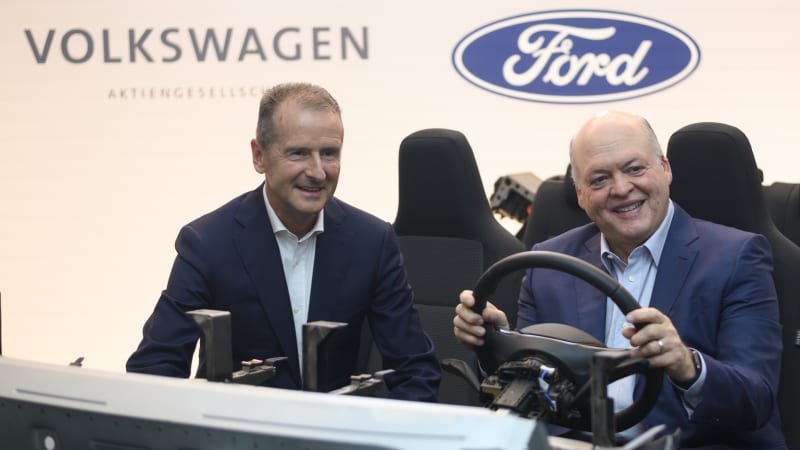VW-Ford isn’t just an alliance, it’s an automotive earthquake
https://ift.tt/2lfurGT

Although Ford CEO Jim Hackett has been criticized for being at times hyperbolic in his pronouncements, when he sat onstage in New York this morning, flanked on his right by Volkswagen CEO Dr. Herbert Diess and on his left by Argo AI CEO Bryan Salesky, and said that the auto industry is in the midst of “the biggest shift in transportation” since the time of Henry Ford, there was absolutely no exaggeration.
The announcement that Ford and Volkswagen AG are expanding their global alliance is one of the biggest events in the auto industry in modern times.
What makes this fundamentally different from, say, the original Renault-Nissan alliance: That deal allowed the continued existence of the two companies, but there was no substantive change in what the companies brought to market — the same sorts of cars, crossovers and commercial vehicles they’d long been producing, just with a bit more cost sharing.
The Renault-Nissan Alliance is not unlike the agreement that Ford and Volkswagen announced earlier this year regarding the collaboration on commercial vans and medium pickups for European and other markets.
Today’s announcement, however, is truly transformative in that Ford will be using the Volkswagen-developed electric vehicle platform — the Modular Electric Toolkit (MEB) — to produce some 600,000 vehicles in Europe over the next six years, a platform that Volkswagen intends to use for the production of some 15 million battery-electric vehicles on a global basis over the next 10 years.
What this part of the announcement underscores is that these two global automotive giants — the two companies combined had sales of 16.7 million vehicles in 2018 — are now creating something of a standard for an electric vehicle architecture.
As Diess explained, by opening up MEB to Ford, the companies can drive down production costs through scale economies. That leads to the ability to offer the vehicles to the consumer at a more attractive price. Which can conceivably increase demand, which, in turn, can further trim costs. And for the vehicle manufacturers, who are presently facing nothing but red ink regarding EVs, there can be, according to Diess, “sustainable and profitable growth.”
One could argue that this is simply a case of Ford buying the MEB from Volkswagen, sort of a straight-up purchase that has no further implication than in terms of a supplier-customer relationship.
But speaking of the development of the Ford electric vehicle for Europe that is to launch in 2023, Joe Hinrichs, Ford president, Automotive, said that it is helpful that the company has an advanced research and development center in Aachen, Germany, whose engineers can work with those of Volkswagen. “A lot of work goes on in developing a vehicle,” he said with understatement.
So here is a case where the two companies are going to be working together to develop and launch a product that is certainly non-traditional in the context of the vast majority of the aforementioned 16.7 million vehicles.
Then there is Argo AI, the company that is developing an autonomous vehicle platform, a startup that Ford invested in two years ago. The finances are a bit tricky, but the bottom line here is that Ford and Volkswagen will have an equal stake in Argo AI, which will account for a “substantial majority” of the privately held company. Volkswagen is putting in $1 billion in funding and wrapping in its Munich-based Autonomous Intelligent Driving (AID) company; AID will become Argo AI’s European operation.
Again, auto companies investing in autonomous vehicle companies is nothing new. In fact, Volkswagen had invested in Argo AI competitor Aurora until this past June; Aurora has investments by Hyundai-Kia and FCA.
But the difference here is that Volkswagen and Ford are looking to achieve a self-driving platform that can be scaled comparatively quickly. Argo AI’s Salesky emphasized that their objectives are to (1) build for scale, (2) architect the software to be production quality, (3) have automotive grade sensors and computers, and, perhaps most important, (4) fully integrate their product with OEMs.
Hackett said that one of the reasons Ford was initially interested in Argo AI was because of that company’s focus on working with a vehicle manufacturer to make its products appropriate for use.
This, too, is a play of a platform that can be scaled. Not only is this somewhat analogous to the MEB in terms of the ability to reduce costs through volume, but there is the additional benefit that by having an Argo AI system on many more vehicles — both Volkswagen Group products and those of Ford — the system, by obtaining data through daily operation, can get smarter and better.
If the future is electric and autonomous, the arrangement between Ford, Volkswagen and Argo AI will define that future and transform the industry.
As Hackett pointed out: If you look at what has happened in the technology sector — think Microsoft and Apple, Facebook and Google — “there will only be a few winners.” By setting de facto standards, Volkswagen and Ford are likely to be among the few.
Auto Blog
via Autoblog https://ift.tt/1afPJWx
July 13, 2019 at 12:17PM
